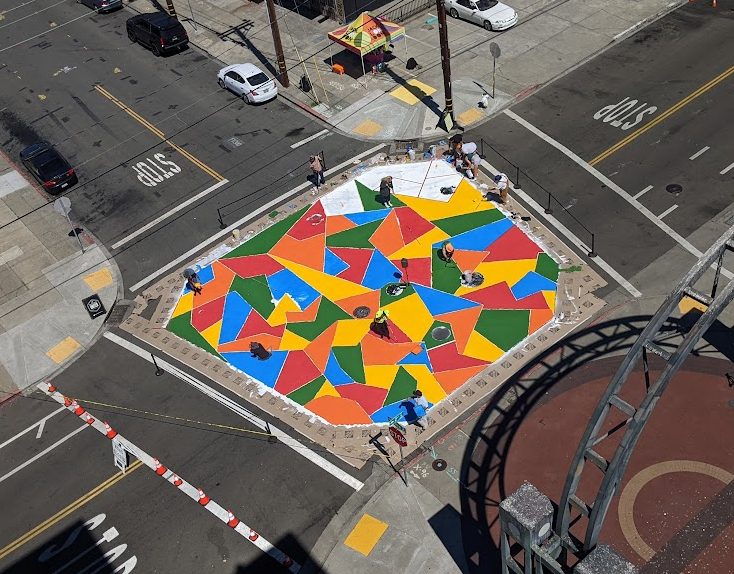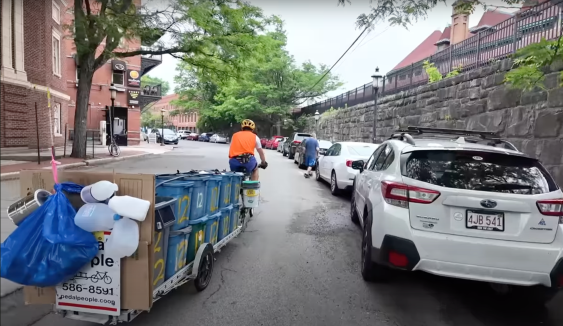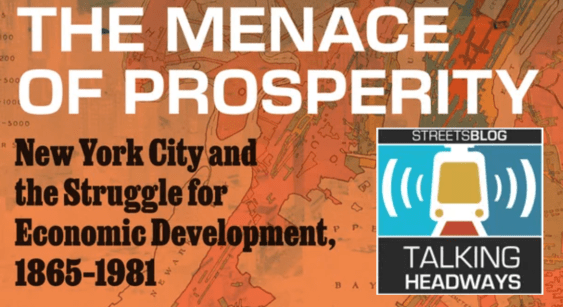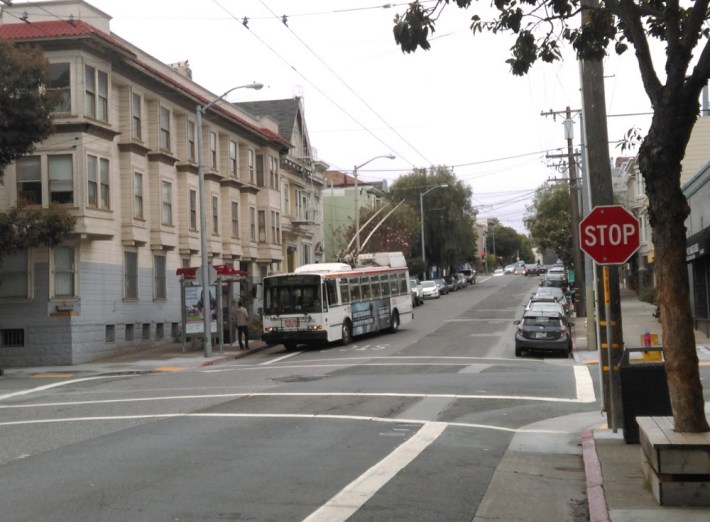
There's a reason Muni's 21-Hayes still stops twice on the block between Central and Masonic Avenues -- the owner of the cafe on the corner of Central demands it.
The SFMTA announced last week that it will ditch plans to remove the inbound bus stop at Central, after a persistent protest campaign by the owner Central Coffee, who insists the stop keeps him in business. As a result, bus commuters will continue to slog through the North of Panhandle neighborhood.
SFMTA Director Ed Reiskin said "we are no longer recommending" removal in an email blast last Friday. Approval of the stop removal was taken off the SFMTA Board of Directors' Tuesday agenda.
The decision was made "based on community feedback" and a push from D5 Supervisor London Breed, according to Reiskin's email. In a statement, Breed said she "received many neighborhood concerns about the removal of the Hayes/Central bus stop."
"The large community contingent requested SFMTA staff and directors to keep the bus stop on Central and Hayes," she said. "For my part, I asked SFMTA to listen to the neighbors concerns about removing the bus stop. And to look for creative solutions to address their concerns while implementing Muni Forward."
Under Muni Forward, the SFMTA is starting to implement stop consolidations along some routes. Protests against have typically come from seniors and the disabled riders near each individual stop -- not merchants.
Reiskin wrote in the email:
As we work to improve Muni citywide, selective bus stop removal is one of many tools in our toolbox to reduce travel times and create a more efficient public transit network. By optimizing the location of bus stops and reducing the number of stops, we can improve service for customers, reduce conflicts between buses and other vehicles, improve safety for people walking and bicycling, and decrease the amount of time buses spend stopped at stoplights.
In 2009, Muni reported that 70 percent of Muni stops are closer than its own policies dictate. A 2010 SFMTA survey found that 61 percent of riders said they would consider walking farther if it made their overall trip faster and more reliable.
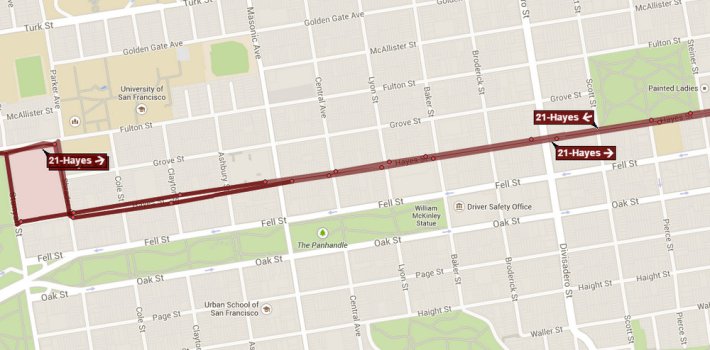
"I've nearly given up on the 21 bus because it's so miserably slow," said NoPa resident Jesse Enlund. "It's frustrating to know that it's only about twice as fast as walking."
The 21 currently stops at all four blocks between Masonic and Baker Street. The SFMTA's policy is to provide stops closer together on steeper grades, but the stretch is mostly flat. Other stretches on the 21 and many other Muni lines are two blocks long.
"I'm not sure how those stops were created in the first place, but the SFMTA has done years of work on [Muni Forward] and it's past time to start implementing those recommendations," said Sarah Harling, a friend of Enlund's who lives a few blocks from Hayes and Masonic.
"There's a tradeoff, every stop has a constituency," Livable City Executive Director Tom Radulovich told Streetsblog when the stop spacing report was published in 2009. "The other thing that unfortunately has happened is that keeping every stop has been mythologized as a social justice movement."
Flyers with large text reading, "HELP US SAVE THE 21 HAYES MUNI LINE!," were distributed to neighbors of Central Coffee. They claimed that removing stops would "likely result in a further reduction in the number of passengers travelling on this line. As with the now defunct 26 Valencia and 4 Sutter bus lines, the 21 Hayes could be deemed inefficient and permanently removed at a later stage."
On the contrary, Enlund said, "I would gladly walk a few more blocks to know I could get three miles in less than 30 minutes."
Central Coffee's owner, Ali Ghorabi, told the SFMTA Board last week that the stop has "enabled me to stay in business" for 20 years, and that older and disabled customers "have really come to depend on that stop, although there's actually two stops very close by." He said the "particular grade" of his stop makes it easier for them to board than at the other stops, which are busier and often blocked by small shuttles.
Georgianna Barker told the SFMTA Board that removing the stop would discourage transit use, and that keeping the stop "encourages neighborhoods to mix and have a more cohesive sense of community."
"Transit is never just a question of cost-benefit analysis," she said. "Even the most nuanced calculations will inevitably fail to take into account the effect that multiple viable options for transit will have on neighborhoods and on people... This may be a question of one or two bus stops, but it speaks to our shared future."
Radulovich said he didn't know of research on whether a bus stop directly in front of a business "is more important than one, say, a block away, but it stands to reason that since urban businesses depend on foot traffic, a location next to a transit stop would increase foot traffic."
"In any case," he noted, "it's heartening that some neighborhood businesses are keener to have a bus stop in front of their storefront than parking spaces." (If the stop is removed, the curb space would be turned into car parking.)
Both stops at Central (in each direction) were originally supposed to be removed in 2012, along with stops at Scott and Broderick Streets, but only the latter two were removed. The stop changes were expedited to make up for parking spots removed for the nearby Fell and Oak Street bike lanes.
On Tuesday, the SFMTA Board will still vote on the removal of the outbound bus stop at Lyon Street, a block away, which, again, was supposed to be paired with the removal of the inbound Central stop. So the 21 will stop twice on the block going inbound -- once for coffee -- but only make one stop outbound.
"The SFMTA should be educating their customers and making some tough decisions that will benefit everyone in the long run," said Enlund. "Having a ridiculously slow bus line erodes confidence in the SFMTA and could potentially lead to less ridership and yet more complaints about the system. It's sad to know that this is just one of many decisions that affect the overall quality of the Muni system."
"People need to see the big picture," he added, "and it should be up to the transit officials to make decisions that are in the best interest of all transit users, and not just the micro-community."
"Should all the other cafes get to have their own bus stop, too?," Harling wondered. "Bread and Butter doesn't have a stop," she said, referring to a cafe on the corner of Hayes and Ashbury Street, a block from Masonic. "But should it?"
